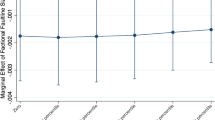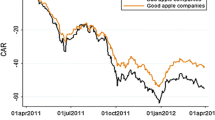Abstract
We examine enforcement action in China’s emerging markets by focusing on (1) the agents that impose this action and (2) the role played by supervisory boards. Using newly available databases, we find that supervisory boards play an active role when Chinese listed companies face enforcement action. Listed firms with larger supervisory boards are more likely to have more severe sanctions imposed upon them by the China Security Regulatory Commission, and listed companies that face more severe enforcement actions have more supervisory board meetings. Our findings are of interest, as supervisory boards in China are generally perceived to be dysfunctional. This study contributes to the existing literature in three ways. First, we shed light on the effects of supervisory boards whose role in a fraud setting has not yet been examined. Second, the study has important policy implications for governance reform. Finally, our analyses provide the most up-to-date picture of fraud and governance issues in China’s ever-growing markets.
Similar content being viewed by others
References
Allen, F., Qian, J., & Qian, M. (2005). Law, Finance, and Economic Growth in China. Journal of Financial Economics, 77, 57–116. doi:10.1016/j.jfineco.2004.06.010
Anderson, D.M. (2000). Taking Stock in China: Company Disclosure and Information in China’s Stock Markets. The Georgetown Law Journal, 88, 1919–1952.
Barth, J., G. Caprio and R. Levine: 2007, Bank Regulations are Changing: But for Better or Worse, Working paper (Brown University)
Baucus, M.S., & Near, J.P. (1991). Can Illegal Corporate Behavior Be Predicted? An Event History Analysis. Academy of Management Journal, 34, 9–36. doi:10.2307/256300
Beasley, M. (1996). An Empirical Analysis of the Relation between the Board of Director Composition and Financial Statement Fraud. Accounting Review, 71, 443–465.
Beasley, M., & Salterio, S. (2001). The Relationship between Board Characteristics and Voluntary Improvements in Audit Committee Composition and Expertise. Contemporary Accounting Research, 18, 539–570. doi:10.1506/RM1J-A0YM-3VMV-TAMV
Chen, G.M., Firth, M., Gao, D.N., & Rui, O.M. (2005). Is China’s Securities Regulatory Agency a Toothless Tiger? Journal of Accounting and Public Policy, 24, 451–488. doi:10.1016/j.jaccpubpol.2005.10.002
Chen, G.M., Firth, M., Gao, D.N., & Rui, O.M. (2006). Ownership structure, Corporate Governance, and Fraud: Evidence from China. Journal of Corporate Finance, 12, 424–448. doi:10.1016/j.jcorpfin.2005.09.002
Cheng, S., Evans, J., & Nagarajan, N. (2008). Board Size and Firm Performance: the Moderating Effects of the Market for Corporate Control. Review of Quantitative Finance and Accounting, 31, 121–145. doi:10.1007/s11156-007-0074-3
Dahya, J., Karbhari, Y., Xiao, J., & Yang, M. (2003). The Usefulness of the Supervisory Board Report in China. Corporate Governance, 11, 308–321. doi:10.1111/1467-8683.00329
Dechow, P., Sloan, R., & Sweeney, A. (1996). Causes and Consequences of Earnings Manipulation: An Analysis of Firms Subject to Enforcement Actions by the SEC. Contemporary Accounting Research, 13, 1–36.
DeFond, M.L., & Hung, M. (2004). Investor Protection and Corporate Governance: Evidence from Worldwide CEO Turnover. Journal of Accounting Research, 42, 269–312. doi:10.1111/j.1475-679X.2004.00138.x
Del Guercio, D., Dann, L., & Partch, M. (2003). Governance and Boards of Directors in Closed-End Investment Companies. Journal of Financial Economics, 69, 111–152. doi:10.1016/S0304-405X(03)00110-7
Everett, J., Neu, D., & Rahaman, A. (2007). Accounting and the Global Fight against Corruption. Accounting, Organizations and Society, 32, 513–542. doi:10.1016/j.aos.2006.07.002
Feroz, E.H., Park, K., & Pastena, V.S. (1991). The Financial and Market Effects of the SEC’s Accounting and Auditing Enforcement Releases. Journal of Accounting Research, 29(Suppl.), 107–142. doi:10.2307/2491006
First Department of Inspection, China Securities Regulatory Commission (CSRC): 2004a, Typical Cases Analyses of Securities and Futures Inspection (year 1993-2000) (Capital Economics and Trade University Press, China) (in Chinese)
First Department of Inspection, China Securities Regulatory Commission (CSRC): 2004b, Typical Case Analyses of Securities and Futures Inspection (Year 2001) (Capital Economics and Trade University Press, China) (in Chinese)
Firth, M., P. Fung and O. Rui: 2006, `Corporate Performance and CEO Compensation in China', Journal of Corporate Finance 12, 693–714
Firth, M., Fung, P., & Rui, O. (2007). Ownership, Two-Tier Board Structure, and the Informativeness of Earnings – Evidence from China. Journal of Accounting and Public Policy, 26, 463–496. doi:10.1016/j.jaccpubpol.2007.05.004
Firth, M., Mo, P.L.L., & Wong, R.M.K. (2005). Financial Statement Frauds and Auditor Sanctions: An Analysis of Enforcement Actions in China. Journal of Business Ethics, 62, 367–381. doi:10.1007/s10551-005-0542-4
Jensen, M. (1993). The Modern Industrial Revolution, Exit, and the Failure of Internal Control Systems. The Journal of Finance, 48, 831–880. doi:10.2307/2329018
Karamanou, I., & Vafeas, N. (2005). The Association between Corporate Boards, Audit Committees, and Management Earnings Forecasts: an Empirical Analysis. Journal of Accounting Research, 43(3), 453–486. doi:10.1111/j.1475-679X.2005.00177.x
La Porta, R., Lopez-de-Silanes, F., Shleifer, A., & Vishny, R. (1998). Law and Finance. The Journal of Political Economy, 106, 1113–1155. doi:10.1086/250042
Li, S. and J. Wu: 2007, ‹Corruption: Why China Thrives Despite Corruption’, Far Eastern Economic Review (April), 6
Liu, T.M. (2005). The Case Analysis on Failures of Enterprise Internal Control in Mainland China. Journal of American Academy of Business, Cambridge, 7(1), 92–98.
Peng, B. 2007, “China Securities Regulation”, Higher Education Press (in Chinese).
Persons, O.: 2006, ‹The Effects of Fraud and Lawsuit Revelation on U.S. Executive Turnover and Compensation’, Journal of Business Ethics 64, 405–419. doi:10.1007/s10551-006-0018-1
Shleifer, A., & Vishny, R. (1997). A survey of Corporate Governance. The Journal of Finance, 52, 737–783. doi:10.2307/2329497
Siebert, M.: 2002, ‹To Encourage Recovery, Encourage Investors’, The New York Times, December 29
Szwajkowski, E. (1985). Organizational Illegality: Theoretical Integration and Illustrative Application. Academy of Management Review, 10, 558–567. doi:10.2307/258136.
Vafeas, N. (1999). Board Meeting Frequency and Firm Performance. Journal of Financial Economics, 53, 113–142. doi:10.1016/S0304-405X(99)00018-5.
Xi, C. (2006). In Search of an Effective Monitoring Board Model: Board Reforms and the Political Economy of Corporate Law in China. Connecticut Journal of International Law, 22, 1–46.
Xiao, J., Dahya, J., & Lin, Z. (2004). A Grounded Theory Exposition of the Role of the Supervisory Board in China. British Journal of Management, 15, 39–55. doi:10.1111/j.1467-8551.2004.t01-1-00399.x
Yermack, D. (1996). Higher Market Valuations of Companies with a Small Board of Directors. Journal of Financial Economics, 40, 185–211. doi:10.1016/0304-405X(95)00844-5
Author information
Authors and Affiliations
Corresponding author
Rights and permissions
About this article
Cite this article
Jia, C., Ding, S., Li, Y. et al. Fraud, Enforcement Action, and the Role of Corporate Governance: Evidence from China. J Bus Ethics 90, 561–576 (2009). https://doi.org/10.1007/s10551-009-0061-9
Received:
Accepted:
Published:
Issue Date:
DOI: https://doi.org/10.1007/s10551-009-0061-9




